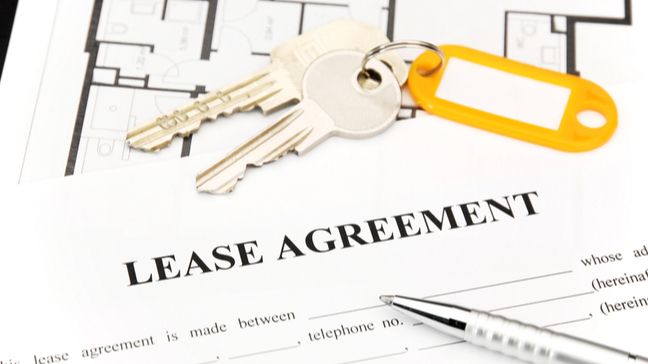We may all strive to be homeowners but when we are just starting out in life, most of us are often renting.
Whether you’re moving out onto your own for the first time or you’re a serial renter saving to make your first home purchase, most of us will rent an apartment or house at some point in our lives. Which means we are entering a world of bylaws we may not be prepared for.
Renting isn’t just finding a place that is suitable for you and your needs at a price you can afford. No. It includes landlords with multiple pages of a lease detailing all that comes with the keys. The rules in the lease will be made to benefit the landlord as much as possible, so it’s important to know your rights as a tenant before you sign on the dotted line.
These tenants’ rights vary from state to state but, regardless of where you live, if you rent or plan to rent an apartment, you can protect your safety, health, and finances by understanding legal and illegal rental practices.
Your rights as a tenant

Non-discrimination
The Fair Housing Act, first passed in 1968 and amended since, prohibits discrimination based on race, color, origin, religion, sex, familial status, or disability. The Fair Housing Act applies to both renting and selling real estate. Therefore, you cannot be turned down for tenancy based on any of the protected classes mentioned.
In some states, such as Massachusetts, this protection also applies to people who use federal or state subsidies to pay all or a portion of their rent.
If you feel you’ve been discriminated against, contact the Department of Housing and Urban Development (1-800-669-9777) to file a complaint.
Quiet enjoyment
All leaseholds are supposed to allow for the right of “quiet enjoyment.” This means you, as the tenant, have the right to reasonable freedom from being disturbed by the landlord.
Unless there is an emergency (i.e. fire or natural disaster) your landlord needs to give you prior notice before entering the premises.
Habitability and repairs
One of the big benefits of renting over owning your own home is that your landlord is responsible for maintaining the building. If the boiler breaks down in the dead of winter and requires a $1,500 repair, it doesn’t come out of your pocket.
Landlords have the responsibility of making sure that the rental is safe and habitable, as well as fixing any major problems that make the property less livable.
An uninhabitable rental (such as one without heating, proper plumbing, or electricity) is one that you can stop paying rent on, or make the repairs yourself and deduct the expenses from future rent.
There are, however, some things tenants have a responsibility to maintain, including:
- Keeping the apartment clean and sanitary.
- Safely operating gas, electrical, and plumbing appliances.
- Disposing of trash.
- Not removing or damaging any part of the building.
- Repairing any damage caused by tenants, guests, or pets.
What about the issues in between a major safety repair (which the landlord is responsible for) and the minor items the tenant covers? When it comes to fixing leaky faucets, squeaky floorboards, or even burned-out light bulbs, some landlords can be notoriously stingy (or just slow).
One way to get in your landlord’s good graces (and save yourself a lot of grief) is to take care of minor fixes – like changing a light bulb – yourself.
Some things will be harder to get than others. If you’re asking for a new dishwasher, there’s not much you can do if the landlord doesn’t want to put one in. If, however, the needed repairs are serious and relate to the apartment’s basic fitness for living (such as heat or a broken lock) you should be firm in requesting repairs.
First notify your landlord, in writing, of the requested repair. Then give him or her a reasonable amount of time to make the fix. Under most laws, 30 days is reasonable, but it depends on the severity of the repair. Two days might be reasonable if the issue is a broken heater in winter.
If your landlord doesn’t follow through, you have a couple of options:
The repair and deduct method
In certain states (check your state law to be sure), tenants may pay for any repairs that affect health and safety (such as a leaky roof, no hot water, a gas leak, or a sewage back up) and then deduct the cost of repairs from the rent (so long as it does not exceed one month’s rent).
Obviously, you must document everything (including communicating the defect to the landlord, giving him a reasonable amount of time to comply, and any repairs you pay for).
The abandonment method
If things are so bad that you cannot safely live in the apartment, you may have a legal right to abandon the apartment and stop paying rent. Obviously, this is a last resort and you can expect some kind of legal struggle if you’re breaking a lease in doing so. But, if the apartment is clearly unsafe and the landlord has made no effort to remedy the situation, the law will usually favor you as the tenant.
Where to find your rights as a tenant
RentLaw.com is one of the best places to find your state laws related to renting and fair housing.
Each state publishes a Tenant’s Rights Handbook, usually downloadable in PDF format from either the Department of Real Estate or the Department of Consumer Affairs. Here’s a look at some of the most common concerns of renters, by state, although be sure to check your state’s Landlord and Tenant Laws as they can often change.
| State | Security deposit returned | Security deposit maximum |
Notice to raise rent | Notice to access premises | Notice of eviction due to late rent | Notice to quit due to violation of lease |
|---|---|---|---|---|---|---|
| Alabama | 60 days | 1 month’s | N/A | 2 days | 7 days | 14 days |
| Alaska | 14 days | 2 month’s | 30 days | 24 hours | 7 days | 24 hours – 5 days |
| Arizona | 14 days | 1.5 month’s | 30 days | 2 days | 5 days | 10 days |
| Arkansas | 60 days | 2 month’s | 1 rental period | N/A but “reasonable” | 3 days | 1 rental period |
| California | 21 days | 30 days | 60 days | 24 hours | 3 days | 3 days |
| Colorado | 30 to 60 days, specified in rent | No limit | Specified in lease | N/A but “reasonable” | 10 days | 10 days |
| Connecticut | 30 days | 2 month’s | N/A | N/A but “reasonable” | 5 days | 5 days |
| Delaware | 20 days | 1 month’s | 60 days | 2 days | 5 days | 7 days |
| Florida | 15 days | No limit | 15 days | 12 hours | 3 days | 15 days |
| Georgia | Not specified | No limit | 60 days | Per lease | Not specified; through court proceedings | Not specified; through court proceedings |
| Hawaii | 14 days | 1 month’s | 45 days | 2 days | 5 days | Immediate |
| Idaho | 21 days | No limit | 15 days | N/A but “reasonable” | 3 days | 3 days |
| Illinois | 30-45 days | No limit | 30 days | 24 hours | 5 days | 5 days |
| Indiana | 45 days | No limit | 30 days | 24 hours | 10 days | Immediate |
| Iowa | 30 days | 2 month’s | 60 days | 24 hours | 30 days | 30 days |
| Kansas | 30 days | 1 month’s | 30 days | 24 hours | 3-10 days | 30 days |
| Kentucky | 60 days | No limit | 30 days | 2 days | 7 days | 15 days |
| Louisiana | 30 days | No limit | 10 days | None | 5 days | 5 days |
| Maine | 21-30 days | 2 month’s | 45 days | 24 days | 7 days | 7 days |
| Maryland | 45 days | 2 month’s | 45 days | N/A but “reasonable” | 5 days | 30 days |
| Massachusetts | Immediate | 1 month’s | Proper notice | N/A but “reasonable” | 14 days | 30 days |
| Michigan | 30 days | 1.5 month’s | 30 days | 24 hours | 7 days | 24 hours to 30 days |
| Minnesota | 21 days | No limit | 1 rental period plus 1 day | None | Immediate | 7 days |
| Mississippi | 45 days | No limit | Per lease | 30 days | 3 days | 30 days |
| Missouri | 30 days | 2 month’s | N/A | None | 5 days | 10 days |
| Montana | 10 days | No limit | 30 days | 24 hours | 3 days | 14 days |
| Nebraska | 2 weeks | 1 month’s | 30 days | 24 hours | 3 days | 14 days |
| Nevada | 30 days | 3 month’s | 45 days | 24 hours | 3 days | 3 days |
| New Hampshire | 30 days | 1 month’s | 30 days | N/A but “reasonable” | 7 days | 30 days |
| New Jersey | 30 days | 150% of rent | 30 days | N/A but “reasonable” | Immediate | 30 days |
| New Mexico | 30 days | 1 month’s | 30 days | 24 hours | 3 days | 7 days |
| New York | 14 days | 1 month’s | 30 days | N/A but “reasonable” | 3 days | 10 days |
| North Carolina | 30 days | 1.5 month’s | None | 24 hours | 10 days | Per lease |
| North Dakota | 30 days | 1 month’s | 30 days | N/A but “reasonable” | 3 days | 3 days |
| Ohio | 30 days | No limit | 30 days | 24 hours | 3 days | 3 days |
| Oklahoma | 30 days | No limit | Per lease | 24 hours | 5 days | Possibly immediate |
| Oregon | 31 days | No limit | 90 days | 24 hours | 3 days | 14 days |
| Pennsylvania | 30 days | 2 month’s | 30 days | 48 hours | 10 days | 10 days |
| Rhode Island | 20 days | 1 month’s | 30 days | 2 days | 5 days after 15 days late | 20 days |
| South Carolina | 30 days | No limit | None | N/A but reasonable | 5 days | 14 days |
| South Dakota | 14 days | 1 month’s | 30 days | 24 hours | 3 days | 3 days |
| Tennessee | 30 days | No limit | None | 48 hours | 14-30 days | 7-14 days |
| Texas | 30 days | No limit | 30 days | N/A but “reasonable” | 3 days | 3 days |
| Utah | 30 days | No limit | 15 days | 24 hours | 3 days | 3 days |
| Vermont | 14 days | No limit except in Burlington and Barre Cities, 1 month’s | 60 days (Burlington 90 days) | 48 hours | 14 days | 30 days |
| Virginia | 45 days | 2 month’s | None | 24 hours | 5 days | 30 days |
| Washington | 21 days | No limit | 14 days | 2 days | 20 days | 10 days |
| West Virgina | 60 days | 1 month’s | None | None | Immediate | 10 days |
| Wisconsin | 21 days | No limit | None | 12 hours | 5 days | 14 days |
| Wyoming | 30 days | No limit | None | None | 3 days | 3 days |
Security deposit

Most states have a statutory deadline for how long a landlord has to give you back your security deposit after you move out.
In California, for example, a landlord has up to 21 days to refund your security deposit. In Massachusetts, a landlord has to give you your deposit back immediately.
In Arkansas, Kentucky, and West Virginia, a landlord has 60 days. Make sure that the landlord has your correct forwarding address so that you can get your money back on time.
Many states also require landlords to provide you with proof of a deposit into an account that is dedicated solely to your deposit, where the interest accrues and will be payable to you. If you are a long-term renter, you could be owed an interest check every year.
Some things that aren’t “rights”
Doing what you want in “your” home
Just because you live in the property doesn’t mean there aren’t restrictions. A lease may specify you cannot smoke indoors or have a pet. If you get caught violating your lease, it is grounds for eviction, and some states’ eviction laws give you three days notice. If you are caught doing anything illegal on the property, such as drugs, it is grounds for immediate eviction.
As a tenant, you’re also responsible for keeping the property clean and safe. Although a landlord is responsible for fixing a broken faucet, if you didn’t keep it clean and it broke due to uncleanliness or lack of care, you’ll actually have to pay the price. It’s not anything goes in a rental.
If you are in an apartment and have neighbors sharing walls, they have rights to quiet. If you are loud and disruptive, your landlord could also begin a quit lease action.
Getting a roommate
If you rent as a single renter but realize you’d fare better financially by having a roommate or fall in love and want someone to move in with you, you actually have to get permission from your landlord. Just as you were vetted, a landlord has a right to vet another person moving in.
Oh yes, and bad news if you have a roommate who suddenly stops paying rent. Your landlord doesn’t care which one of you is paying as long as they’re getting paid every month. You’re responsible.
Having creature comforts
Tenants do not, by law, have the right to an off-street parking space, on-site laundry, air-conditioning, or a working dishwasher. At certain rentals, these perks may be promised as part of your lease, but your “right” to these amenities very much depends on the language of the lease you signed.
Unless the lease explicitly guarantees you a dedicated parking space available 24/7, 365 days a week, you might not have strong recourse if the landlord’s son starts parking in your spot.
There are some states that do detail what a landlord must provide. For example, air conditioning is required in Alabama. Checking the laws beforehand could get you some perks.
The biggest tip to protect your rights: put everything in writing

Unfortunately, too many people think not having a lease is a perk for tenants or a sign of a landlord’s friendliness. While renting an apartment without a lease may work out sometimes, it can also backfire badly.
Yes, leases enforce certain responsibilities on tenants, but they also specify the terms of the landlord-tenant agreement. If there are disagreements, both parties have guidance on how to resolve them.
Aside from leases, it’s also vital to document all of your communication with your landlord. That includes rent payments and any requests for repairs. It’s fine to have a phone call first, but always follow it up with a letter or email, for example:
It was nice speaking with you yesterday about our apartment. We greatly appreciate you hearing our concerns regarding the leak in our bedroom roof and that you agreed to have someone look at it within the week. If anything changes, please let us know as soon as possible.
Seriously, don’t forget renters insurance
One newer addition appearing on leases is a landlord’s requirement that a tenant has renters insurance. Landlords can include this item in the lease and request proof of insurance. As the landlord is responsible for the building’s structure, what is inside is your responsibility.
Renters insurance is similar to homeowners insurance, but it covers the loss or damage to the renter’s personal property such as clothes, jewelry, electronics, and furniture. Some renters insurance policies also cover liability due to an injury on the rental premises.
Why may a landlord want you to have renters insurance? Say a fire broke out due to your negligence, such as leaving a candle burning overnight? Renters insurance would cover the damage. Even if your landlord doesn’t require it, it’s beneficial for you to have.
The good news is renters insurance is not as expensive as you may think. Still, when it comes to searching for the right coverage at the lowest costs, there are some companies that make the process easier.
As a tenant, it’s always worth it to call a few different insurance companies and shop around for a good renters insurance rate. If anything were to happen during your tenancy, you’d be glad you chose to have that extra protection for your personal items. One great place to start is as Policygenius, a website that scours the online marketplace for the best insurance rates available – give them a try to see if you can find yourself the perfect policy.
Lemonade is another great up-and-coming insurance company that offers renters insurance starting at just $5 a month (but that depends on the plan you choose). You can get a quote for Lemonade renters insurance by answering a few questions from the company’s friendly chatbot and Lemonade makes it easy to customize your policy based on the coverage you need. Read our full Lemonade review.
Note: Even if your roommate has rental insurance, it’s still a good idea to get your own policy. Attorney Aaron Larson writes on the legal website ExpertLaw, “Typically, even where people live as roommates, a renters policy held by one roommate will not cover the property of the other.”
What to do if you believe your landlord is violating your rights
If you believe your landlord is violating your rights as a tenant, the best thing to do is pick up the phone and speak with somebody qualified to help.
If you’re unsure of what to do in your situation, contact the Department of Housing and Urban Development (HUD). HUD offers free counseling related to renting in all 50 states. (Here’s how to find a HUD-approved housing counselor in your area.)
If a housing counselor suspects you have a legal issue, you’ll need to speak with an attorney. Just getting an attorney on retainer can cost several thousand dollars, depending on your situation. If an attorney feels your rights have been violated, he or she may be willing to take your case pro bono, but it is unlikely unless you can prove your inability to pay. In most states, however, the Department of Justice will provide free legal services to those who are classified as being low-income. This Department of Justice’s legal service website can help you find local attorneys and self-help resources. Others can locate a qualified attorney using the ABA’s Lawyer Referral Service.
Summary
When we rent apartments, we often feel like the landlord has all the power, but that’s not really true at all. Renter’s have A LOT of rights – most just don’t realize it.
If you end up with a crummy landlord, it’s often worth a bit of research to determine if he or she is actually breaking the law and what you can do about it.


